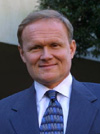Quinlan on board as UMA chief executive officer
by Cindy AbolePublic Relations
To Bruce Quinlan, University Medical Associates (UMA) chief executive officer, recognizing people and the values of good quality care are essential elements in the practice and business of medicine.
 Bruce
Quinlan
Bruce
Quinlan
Quinlan's challenge is balancing the changing demands of health care while living with the reality of financial constraints in the management of the university’s faculty practice plan.
“I am delighted that Bruce Quinlan has decided to join us,” said MUSC President Ray Greenberg, M.D., Ph.D. “He comes with a strong background in finance and considerable experience at Duke in practice plan management. I am confident that he will lead UMA to improved fiscal performance, while he builds positive working relationships with the physicians and staff.”
Quinlan views his role with UMA with as much anticipation and resolve as a quarterback preparing for a bowl game. At this early stage, his concentration focuses on learning about UMA and MUSC and handling immediate issues while shifting other work and establishing new priorities.
“Where I want to focus is working with the physicians and leadership of UMA and MUSC to establish new strategies and set priorities,” said Quinlan. “I will also be working with the management team to improve our blocking and tackling in various aspects of our business.”
Quinlan’s presence completes a trio of key appointments last year associated with UMA. In August, the organization’s first CEO Marion Woodbury stepped down, assuming a new role in the President’s Office supporting the phased hospital replacement strategy. Quinlan joins Jerry Reves, M.D., College of Medicine dean and vice president of Medical Affairs, and Bruce Elliott, M.D., UMA president and surgeon. The three will work closely with the university’s 500-plus physicians in defining and guiding UMA’s overall mission.
“UMA couldn't have found a better person in Bruce Quinlan,” said Reves, who first invited Quinlan and other Duke colleagues to MUSC last June. “We’re currently at a point in UMA’s growth and management where we need another set of skills to effectively run and manage the organization.”
Quinlan’s track record in the management of physician practice plan groups has been sound. He previously worked as chief financial officer with the Private Diagnostic Clinic, an 830-member physician practice plan at Duke Medical Center in Durham, N.C. Most recently, he worked with the Hunter Group, a health care consulting firm that specializes in financial turnarounds. He also managed other successful plans of various sizes in markets including Chicago, Baltimore and the University of Wisconsin Medical School in Milwaukee.
“Health care today is so complex,” said Quinlan, citing the federal government’s impact on how things are done in medicine. “For example, there are often so many ways to code a medical service which can directly impact how much the service will be paid for by the insurer. Meanwhile, we have to manage expenses in recognizing that the reimbursement for most of our services will be less than the cost.”
Challenges in information management remains a huge handicap in managing the physician’s side of business. The use of more integrated information systems that provide accurate appointment scheduling, patient registration and billing will save time and money. According to Quinlan, UMA will begin implementing such a system in the next few months.
“Bruce will not only work with the UMA executive committee regarding recommendations, but he will be open to listening to plans and concerns from our physicians,” Reves said. “They will eventually see him as a listener and advocate who will support their needs.”
When asked to compare UMA to the physician’s group at Duke, Quinlan stated that there were more similarities than differences. The main differences are that Charleston is a much more competitive health care market and the physicians at Duke are organized into a for-profit corporation. Quinlan hopes to guide UMA with the continued focus on the university’s common missions of education, research and clinical care.
For now, Quinlan’s happy about his return to the Carolinas, especially
the Palmetto State. To him and his family, it is a homecoming. Back in
the early 1980s, he spent two years in Columbia, earning his masters in
accounting from the University of South Carolina. “I think we’ve
already got almost everything here to get the job done,” said Quinlan.
“Now, it's just a question of formulating, implementing and executing new
strategies. There’s a lot of difficult work to be done but I think the
outcome will be consistent with what I’ve seen in the past, which is boosting
the overall performance through efficiency within the organization. Employee
morale and patient care can also be increased. This is the outcome I want
to accomplish.”